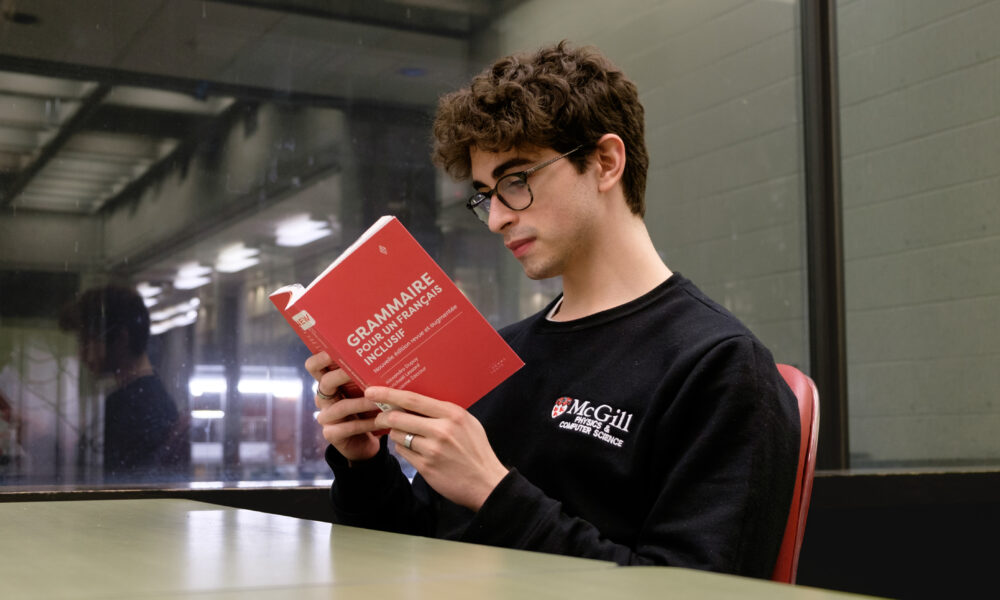For many McGill students, brushing up on their French is on their never-ending to-do list. Or maybe you’re a prospective McGill student worried about Quebec’s plan to have 80 per cent of non-Francophone students speak an intermediate level of French. Either way, learning French is a great way to feel more comfortable in the city, improve your resume, and become more connected to the broader Montreal community. Here are some tips for easy and low-cost ways to improve your French listening and speaking skills.
Tip 1: Taking a French class
Preserving and increasing the use of the French language in Quebec has been the goal of the provincial government for decades. While it’s often taken to an almost–laughable-if-it-weren’t-so–tragic level, it means that there are plenty of cheap and subsidized ways to learn or improve your French. Both the Quebec government and McGill offer many resources for those looking for courses. For graduate students, the Post-Graduate Students’ Society (PGSS) offers classes for different levels of French proficiency. And apps such as Duolingo and Memrise offer free self-guided lessons.
Tip 2: Taking a class in French
Going to yoga, a pottery class, or a museum tour in French is a great way to learn by listening. Even if you don’t catch everything, your ears will get more accustomed to the language, and you’ll soon realize that your vocabulary and comprehension have expanded. The great thing about taking a class is that you can always ask the instructor to repeat themself or slow down if you’re missing too much. Maybe just don’t take a first aid class or something else where it’s life-or-death if you misunderstand.
Tip 3: Exploring Montreal, and Quebec
Practicing your French in the McGill Bubble can be difficult as many workers and residents are bilingual and will often switch to English when they hear your non-francophone accent. Certain parts of Montreal are more French than others. Neighbourhoods like Rosemont la Petite-Patrie, Pointe-aux-Trembles, Villeray, and Anjou could be good options to flex your French while seeing some new sights. If you’re feeling more adventurous, day trips to Trois-Rivières, Saint-Sauveur, or Drummondville are an even more immersive option.
Tip 4: Joining conversational groups for practice
Both McGill and Montreal are home to many clubs and organizations geared toward helping people improve their French, which is great for those who want to practise speaking in a judgment-free environment. Conversation groups are often grouped roughly by level so that you are sufficiently challenged. Dedicating an hour or two a week to only speaking French will improve your accent, make practicing less nerve-wracking, and expand your vocabulary.
Tip 5: Finding French-speaking friends
Learning French through natural conversation helps build confidence and pick up on nitty-gritty details Duo won’t tell you about. An ad on Facebook Marketplace could work (although it might give off a strange vibe), but just finding some Francophones in your classes or wandering over to UQAM will do the trick as well. Let them know that you’re trying to learn French and ask them to speak a bit with you; you’ll be fluent in Franglais in no time.
Tip 6: Watching TV in French
There are two ways of going about this: You could either find French-language shows and movies, or you could use the French dubs on your favourite shows. Both methods are valid, it just depends on whether you prefer being put off by something like Brooklyn-99 dubbed in French or the less inclusive Quebecois version, Escouade-99.
Tip 7: Putting French as a default language
Changing the default language of your devices is a great trial-by-fire method of learning French. It’s the equivalent of a bridge troll who will only let you pass if you ask in French. Need to turn off your flashlight after accidentally turning it on in the middle of class? Try looking quickly for the “lampe de poche.” You’re going out for the night but your phone is only at 8 per cent? You better find the “économiseur de pile.”








